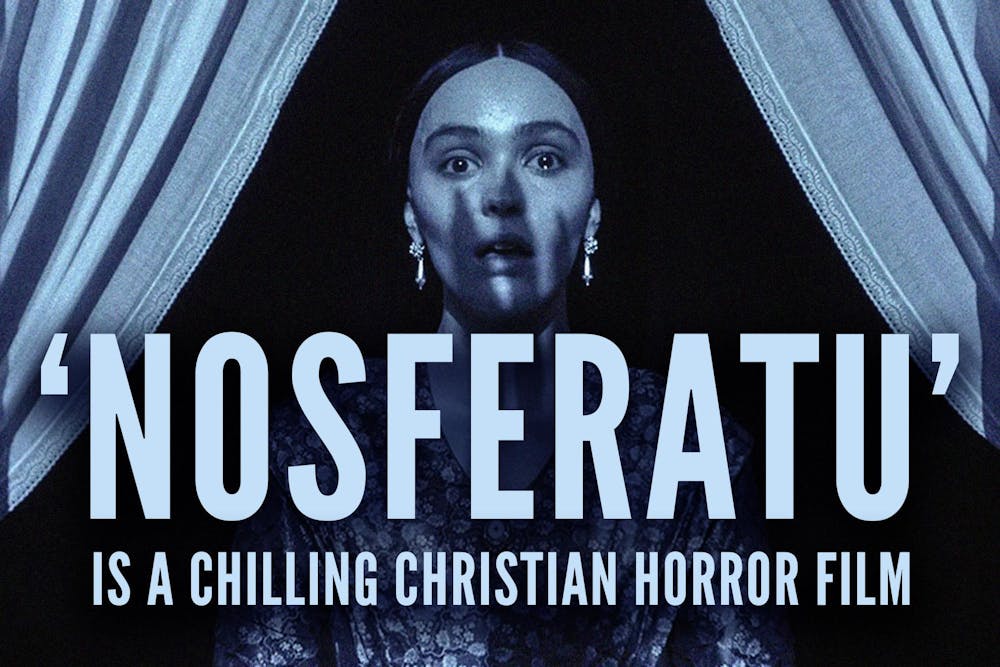Not to flex, but I’m kind of a Nosferatu expert. Last semester, I became very familiar with the 1922 original as part of my German History Through Film class, which I highly recommend if you’re looking for a fun and engaging way to complete your Integration core. As I learned about the film and its historical context, I grew skeptical of what director Robert Eggers was trying to accomplish with his remake. The original seemed inextricable from the post-WWI trauma that birthed it. However, as I sat in my local theater over break to watch the film, my skepticism faded as I became entranced by Eggers’ fresh and insightful take on Nosferatu. Eggers reframed the story around the eternal struggle between good and evil, intellect and concupiscence. In doing so, he’s crafted one of the richest Christian films to emerge from mainstream Hollywood.
For those unfamiliar with the basic story of Nosferatu, it is about a couple, Thomas and Ellen, whose lives are disrupted when Thomas goes to a remote castle to assist the mysterious Count Orlok with a property purchase. Thomas discovers that Count Orlok is the vampire Nosferatu, who then brings death and terror to their town as he seeks out Helen’s affection. Eggers, however, has largely crafted a new story from these basic plot beats. Ellen and her demonic romance with Nosferatu are now the main focus of the story. Thus, Eggers has transformed “Nosferatu” into a psychosexual drama blown up to supernatural proportions. Lily-Rose Depp as Ellen superbly handles the greater importance of her character in the story. She is absolutely transfixing in the role; her performance is full of terrifying physicality and emotional desperation. It is a career-making turn for her, and I am incredibly excited to see what she does next.
This new interpretation turns “Nosferatu” into a chilling meditation on original sin. It explores humanity’s dark impulses that rebel against reason and incline us toward evil. St. Paul’s words in Romans 7:15 — “I do not do what I want, but I do the very thing I hate” — capture this struggle. Nosferatu is terrifying not just because he is evil, but because he reveals the evil within humanity due to original sin. He is the personification of sin, tempting us to give in to our evil desires that only make him more powerful and us weaker. We see that in how he exploits Thomas’ greed and careerism to invade Germany by way of real estate business. And we especially see that in the way he exploits Hellen’s disordered concupiscence. Her fractured psyche oscillates between her demonic lust for Nosferatu and her love for Thomas, epitomizing the perennial battle humanity faces in its fallen nature. We all have disharmony between our lower and upper faculties, and this inner rupture leads us to stray away from good and disobey reason. Nosferatu wants Helen to believe any attempt at good is futile and that she should just succumb to the darkness within herself. But despite our fallen nature, goodness is still possible in this world, and it is most present in the loving relationships we have with one another. This is what makes the film’s ending so powerful and poignant, as we see Helen choose love and emulate Christ’s atoning work on the cross for all our sins.
We see characters throughout the film struggle to grapple with the very real spiritual battle between good and evil. Aaron Taylor-Johnson’s portrayal of a brash skeptic perfectly exemplifies the secular mentality. Though attacked by critics, I found his performance compelling; his materialistic worldview blinds him to the supernatural stakes, rendering him callous toward Ellen and powerless against Nosferatu. Refusing to acknowledge the darkness inside us only weakens our ability to resist it. This repression is what ultimately unleashed Nosferatu, as society prohibited Helen from properly treating her inner turmoil, rendering her vulnerable in the wake of Thomas’ departure. Nosferatu can only be defeated when people confront him with faith and supernatural wisdom. Professor Franz, wonderfully played by Willem Dafoe, is an eccentric occultist who, while not a full Christian, is able to acutely identify the spiritual battle Ellen is facing and the true danger Nosferatu represents. Additionally, the Christian Romani that Thomas encounters in Transylvania are able to ward off Nosferatu and heal Thomas’s wounds through prayer and genuine faith.
While I emphatically love what Eggers has done with the story, I am more ambivalent about the film’s visual direction. Set in 19th century Germany, Eggers’ penchant for historicity brings the period alive with sumptuous set design and costumes. Moreover, the mise-en-scène frequently provides evocative and chilling imagery. However, the cinematography disappoints. Gone is the bold German Expressionist look of the original film; most of “Nosferatu” has flat, uninspired lighting that adds nothing to the atmosphere. Though ultimately serviceable, it lacks the visual flair to match the richness of Eggers’ vision.
“Nosferatu” surpassed all my expectations. Not only did it prove itself to be a worthwhile remake of the iconic original, but it also transformed the story into an incisive Christian psychological thriller. This film goes beyond banal platitudes about faith or didactic proselytizing to fearlessly wrestle with our fallen nature. With this film, Eggers continues to assert himself as a singular talent in Hollywood.










